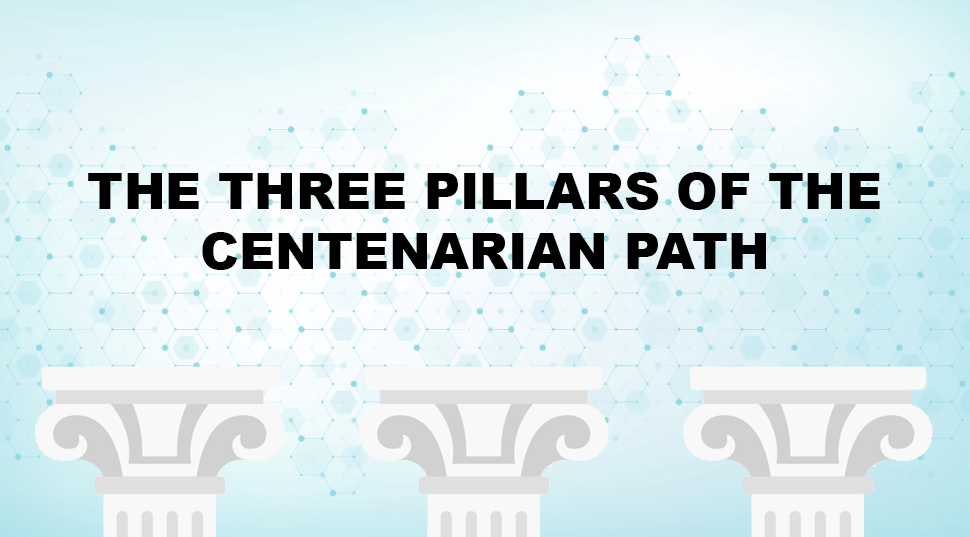The three pillars of the Centenarian Path

When people think about Centenarians, they often go right to diet, what did that person eat to live so long? Studies on Blue Zones focus on diet, and of course, for good reason - diet definitely plays a role, a major one, in lifespan, but there's a lot more to consider.
After reading just about everything I could get my hands on about the science behind lifespan, I have come up with a model with three main pillars. Why I think the pillar model is so important is because it moves forward the idea that there isn't any one thing you can do to increase your lifespan, it's doing multiple things together that makes the difference.
I also think that people do need to realize that there is a cost, a real financial factor that comes into play when you're looking at leveraging modern science to live longer. It's a harsh reality but one that I think is important putting forward right away because to follow the Centenarian Path does require a real budget. At the same time, you don't have to be a millionaire to follow the path, but you do need to be able to spend say an extra $200 - $300 a month.
If I haven't scared you away yet, then let's dive in, below are the three pillars to the Centenarian Path.
Pillar 1: Avoid Group 1 Carcinogens
This should be a pretty obvious one, but it's #1 for a reason, it is the most important. If you want to live to 100, or longer, you'll need to avoid things that are proven to cause cancer. You can view a full list of Group 1 Carcinogens here.
What might surprise some people is that alcohol is on this list. Yes, just like cigarettes, alcohol causes cancer. If you want to live to 100 or longer, you'll want to stop drinking alcohol, and just like you don't smoke cigarettes in moderation, I'm not talking about drinking alcohol in moderation, I mean stop drinking completely.
Pillar 2: Take supplements that halt or reverse aging
Here's where the $200 - $300 per month budget comes in. One of the key ways to leverage modern science to get on a real path towards living longer, is taking supplements that halt or reverse aging. This is at the core of longevity plans from people like Harvard researcher and longevity expert David Sinclair - here's what he takes.
One fun fact that might make Pillar 2 easier to handle. How much do you currently spend each month on alcohol? Many people spend $200 - $300 per month on alcohol, easily. So eliminating alcohol could fund your longevity supplements without requiring any increase in budget, you're just switching what the money is going to.
I can't stress this enough. So many people can literally just move money away from a Group 1 Carcinogen into anti-aging supplements and spend absolutely no extra money. Think about that.
As for what supplements to take, this will be the subject of future posts, for now just accept this as one of the core pillars in the Centenarian Path.
Pillar 3: Optimize the food you eat and when you eat it
It might shock you to hear that you might not have to become a vegetarian to live to one-hundred. But, you will need to change when you eat, how much you eat, and yes, you'll probably need to optimize more in the veggie-direction.
At the core of food optimization is removing processed foods as much as possible from your diet. While you might love shopping at places like Trader Joe's - grocery stores like this are full of processed foods. Just think, if the food comes in a cardboard box and has some ingredients you can't pronounce, avoid it.
As for when you eat, intermittent fasting is a key piece in the puzzle. The easiest way to start this is to stop eating breakfast, or lunch, or dinner, you pick. Once again, just like Pillar #2, I will be doing a deep dive into diet and eating habits in a future post.
That's it. These three pillars are the core focus areas for the Centenarian Path as defined by me. As a reminder, I'm not a doctor, or a scientist, what I'm putting together is a path to live to 100 (and beyond) with what I've learned from reading, watching, and listening to everything I can about longevity.
Nothing on this site should be taken as medical advice or financial advice. Do your own research and make your own decisions.
With that - I look forward to doing a deeper dive into each of these pillars. Thanks for reading!